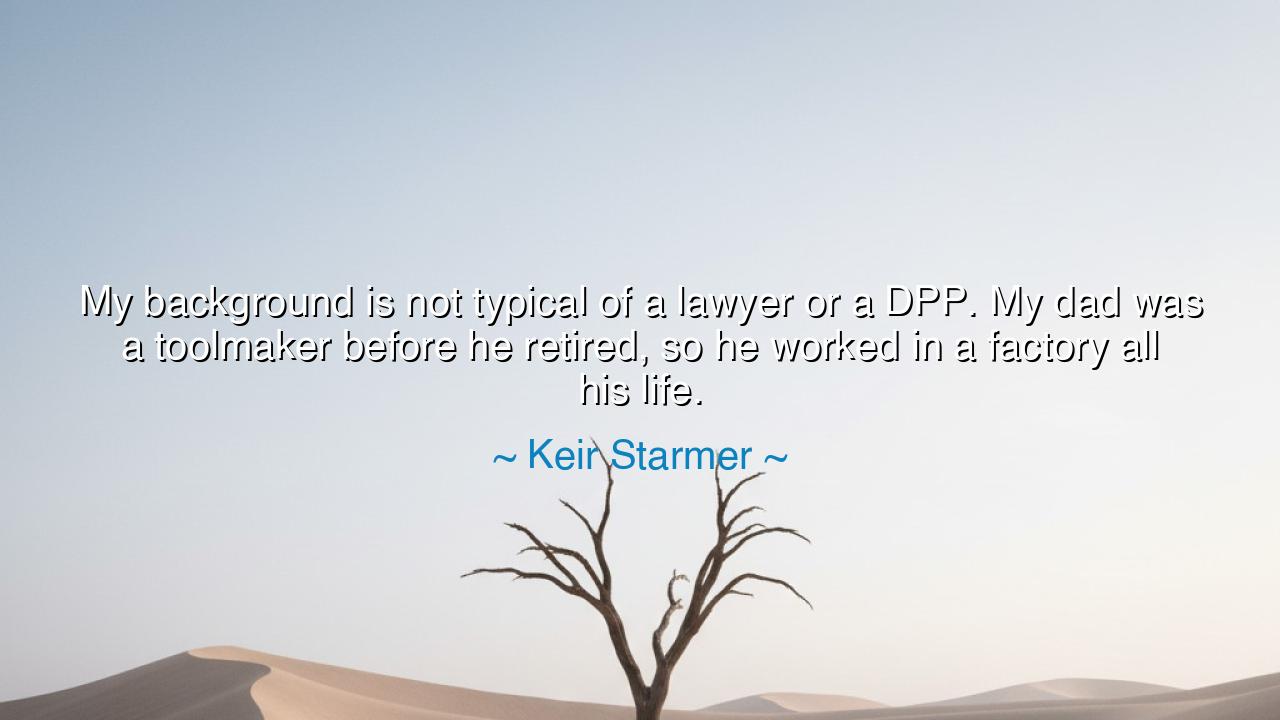
My background is not typical of a lawyer or a DPP. My dad was a
My background is not typical of a lawyer or a DPP. My dad was a toolmaker before he retired, so he worked in a factory all his life.






Listen, O seeker of understanding, to the words of Keir Starmer, who proclaims with candor and humility: “My background is not typical of a lawyer or a DPP. My dad was a toolmaker before he retired, so he worked in a factory all his life.” In these few sentences lies a profound meditation upon origin, toil, and the ascent of the soul beyond circumstance. Starmer speaks not merely of occupation, but of lineage, of the quiet dignity of labor, and of the ways in which the roots of a family shape the reach of a life. The son of a toolmaker, he ascended to halls of law and justice, yet he carries with him the echo of the factory floor, the rhythm of machines, and the virtue of hard work and perseverance.
In the annals of history, the ancients held in high regard the notion that greatness need not spring from nobility alone, but could be forged in the fires of ordinary life. Consider the Roman general Scipio Africanus, whose early education was modest, whose beginnings were unremarkable, yet whose courage and intellect led him to triumph over Hannibal and to become a name immortal in the chronicles of Rome. Starmer’s acknowledgment of his nontraditional background resonates with this same principle: that the measure of a man is not where he begins, but how he molds his talent, his virtue, and his will against the trials of life.
The voice of his father, the toolmaker, rings like the heartbeat of endurance itself. Each day spent shaping metal, each hour devoted to precision and diligence, instills lessons that cannot be read in books. It is here that the son absorbs discipline, patience, and respect for labor, virtues that serve him well in the chambers of law and the corridors of power. The humble workbench becomes, in retrospect, a school of nobility, where the ethics of toil are taught in silence, yet remembered eternally.
Consider also the story of Abraham Lincoln, who emerged from a log cabin, the son of a frontier laborer, to rise as the defender of justice and union. His early life of struggle, of manual toil and relentless self-education, became the foundation of his wisdom and empathy. So too does Starmer illustrate that the path to achievement is not paved with privilege alone, but with the steadfast embrace of one’s roots, and the courage to transcend expectation while remaining connected to it.
Yet within Starmer’s words is a subtle lesson in humility and perspective. To speak openly of an origin “not typical” is to remind us that society often erects invisible barriers, that the corridors of prestige may appear sealed to those outside their customary ranks. And yet, through dedication, intellect, and moral clarity, these barriers may be surmounted. The journey from the factory to the bench is not merely professional; it is a testament to the human capacity for growth, to the triumph of diligence over circumstance.
From this reflection flows the eternal lesson: the worth of a life is not in the trappings of inheritance, nor in the privileges of birth, but in the moral fiber cultivated through labor, learning, and steadfastness. Starmer’s narrative invites all who hear it to honor the work of their forebears, to carry their lessons forward, and to recognize that excellence is born from the fusion of humble origins and determined aspiration.
Thus, practical counsel emerges: respect your beginnings, whether modest or grand, for they hold the seed of character. Engage diligently in your craft, learn without ceasing, and allow the virtues instilled in you — discipline, patience, empathy — to guide your ascent. Like Starmer, rise with integrity, carrying the honor of your lineage, and let your journey illuminate the path for others who follow. In doing so, the echo of the toolmaker’s hands endures, not only in machines, but in the shaping of justice, wisdom, and enduring legacy.
O remember: greatness is not given, it is forged, and every hand that toils is a forge of tomorrow’s triumphs.






AAdministratorAdministrator
Welcome, honored guests. Please leave a comment, we will respond soon